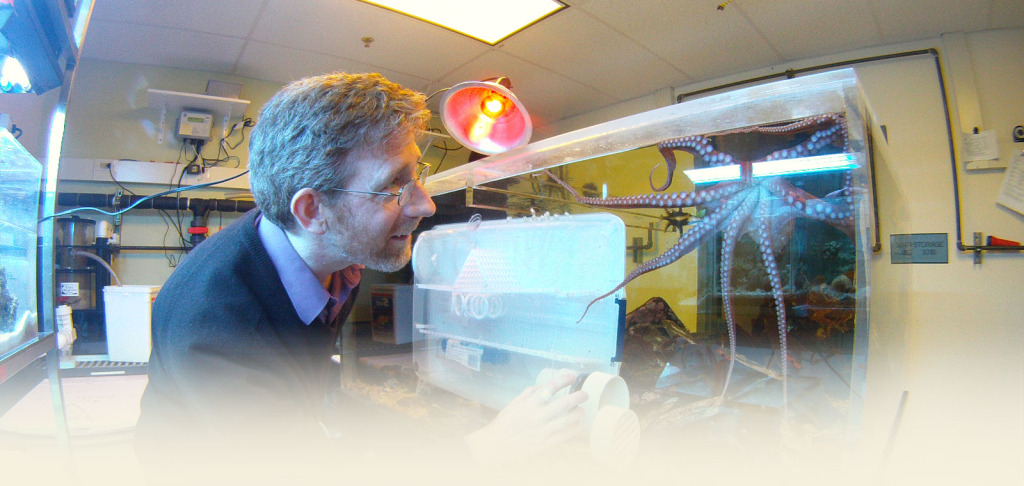 Anchorage Daily News readers learned about the University’s pioneering research on the little-understood giant Pacific octopus and whether its lineage includes a new species.
Anchorage Daily News readers learned about the University’s pioneering research on the little-understood giant Pacific octopus and whether its lineage includes a new species.
Following her visit to the 1,000-gallon saltwater tanks on the third floor of Grant Hall, reporter Michelle Theriault Boots explained the sights, smells – and touch – of APU’s giant Pacific octopuses, Khaleesi and Dean.
“Both (octopuses) have a dusky rose hue, the smell of sea and musk, and undulating tentacles that feel like a wet suctioning bath mat, only stronger,” Theriault told Daily News readers. Her article was published June 22.
Highlighted was a study by Professor David Scheel and involving, among others, graduate students Beki Toussaint and Matthew Perlin and undergraduate Nathan Hollenbeck, a senior majoring in marine biology.
Hollenbeck is a co-author with Scheel of findings published in the fall 2012 issue of the American Malacological Society Newsletter. “It’s a big deal for a college senior to co-author a paper raising the possibility of identifying a new species,” Theriault wrote. Toussaint and Scheel are among authors of a peer-reviewed article on the topic published in Conservation Genetics in 2012.
Dr. Leslie Cornick, marine biology professor and Environmental Science Department chair, said that work by Scheel and his students stretches to 1995, positioning the University to contribute to science in novel ways. Scheel directs the University’s Behavior and Benthic Ecology Lab.
“Long-term data permit our students to form questions with real-world implications when it comes to concerns like habitat and resource development,” Cornick said. “Articles like this one (in the Anchorage Daily News) help more people understand that active learning at APU gets results.”
Samples collected by APU researchers were analyzed by the Anchorage-based U.S. Geological Survey. “It’s in the really early stages,” Hollenbeck said of the possibility of new species classification.
In their article, Hollenbeck and Scheel described morphological, behavioral and body patterning characteristics. The biologists asked whether recent genetically distinct molecular evidence suggests that a previously unknown cryptic species of giant Pacific octopus may be dwelling in Prince William Sound.
Scheel and APU students traveled in June to the intertidal zone of Prince William Sound beaches for more data collection. He departs next for Australia to work with a colleague investigating octopus conscientiousness. Interest gained momentum last year when leading neuroscientists signed the Cambridge Declaration on Consciousness and included the octopus as the only invertebrate mentioned by name.
Committed to personalized instruction incorporating Alaska as our principal classroom, APU is an accredited liberal arts and sciences university that engages students in applied, project-based learning and faculty collaboration.
